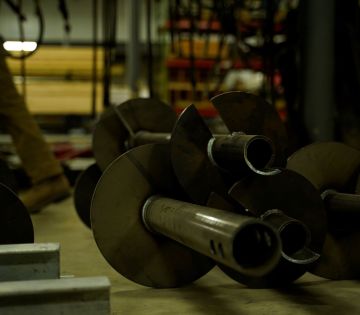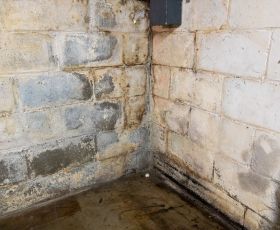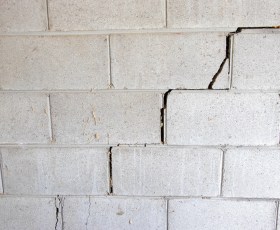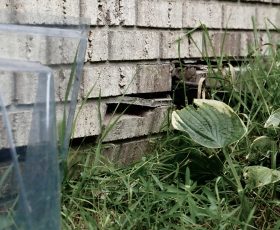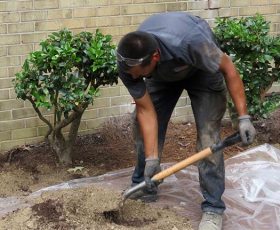Problem Signs
At first glance, a foundation problem may seem like an extreme problem. However, if you identify the damage before it becomes too advanced, most foundation issues have simple, permanent solutions — many of which can be completed within a day! The key is to recognize the problem early and make sure you call in a foundation repair specialist with the tools and expertise to effectively tackle the problem.
Foundation Repair of Western Colorado

Bowing Walls
Foundation walls move inward primarily due to expansive soils and hydrostatic pressure on the walls from outside.
Foundation Repair of Western Colorado

Uneven Floor
Sinking floors can lead to a variety of other issues, including jamming doors and drywall cracks.
Foundation Repair of Western Colorado

Wall Crack
Foundation wall cracks have several different causes, and each has its own unique solution.
Foundation Repair of Western Colorado

Tilting Chimney
If your chimney’s foundation (or the soils underneath that foundation) are unable to support the weight of the chimney, it will begin to tilt.
Causes
Your house could be experiencing these problems for many reasons – settlement sinking, foundation heave, and poorly compacted fill soil, just to name a few. But they all have something in common – the ground your home was built on. The soil under and around your house has a significant impact on the structure.
Previously excavated soil to accommodate your home’s construction is backfilled and replaced around the foundation walls once they are complete. This loose, fluffy, aerated soil is not tightly packed like undisturbed soil farther away from the house. Because of this, water can easily collect in the soil directly surrounding the home and create a “clay bowl.” The soil expands and contracts as it becomes saturated and dries out. When saturated soil expands, it puts pressure on the foundation walls known as hydrostatic pressure. When this constant force becomes more than the walls can bear, they will begin to show signs of failure in the form of cracks and inward movement.
Soil, specifically the loosened, backfilled soil around your house, naturally settles over time. But as it does, it can do so at an angle sloping towards the foundation, rather than away from it. This contributes to the clay bowl effect and hydrostatic pressure, and associated water intrusion and wall cracks. The soil under your house also can settle unevenly, which can lead to uneven settling of your foundation. When this happens, you’ll notice diagonal cracks in drywall and from corners of windows and doors. These windows and doors also may not open or close properly.
If you have a fireplace, you’ll need to be on the lookout for exterior issues with the chimney. A more dramatic sign of foundation failure is a chimney that is cracking and leaning. Chimneys may not be built on the same soil as the rest of the foundation or have the proper footing. When this is the case and the soil cannot properly support the chimney or its weight, it will begin to crack and pull away from the rest of the house.
Just as water seepage and wall cracks can occur from hydrostatic pressure, water can easily leak into a crawl space under the house. One major way this happens is through open crawl space vents. Any water and moisture that’s created from infiltrating outside air can do some serious damage to the structural supports in the crawl space that hold up the rest of the house. Wooden supports can rot, warp, and buckle, and metal supports can rust and corrode. This all leads to sagging and soft floors above, as well as contribute to problems with hardwood floors.
Solutions
Whether your home is experiencing structural damage from foundation settlement, hydrostatic pressure, soil washout, frost, or some other force, we have the products that you need to permanently solve your problem and restore value to your home.
Foundation Repair of Western Colorado

Channel Anchor
The Channel Anchor System permanently stabilizes and repairs bowing or tilting foundation walls — without the cost and disruption of total foundation replacement.
Foundation Repair of Western Colorado

Helical Piers
Helical pier systems create a solid supporting base that transfers the weight of your home downwards to strong supporting soils.
Foundation Repair of Western Colorado

Push Piers
The Push Pier System permanently stabilizes foundations that are damaged by settlement.
Foundation Repair of Western Colorado

Wall Anchor System
The Wall Anchor System permanently stabilizes your basement walls, offering the best opportunity to straighten the walls without the cost and disruption of foundation replacement.
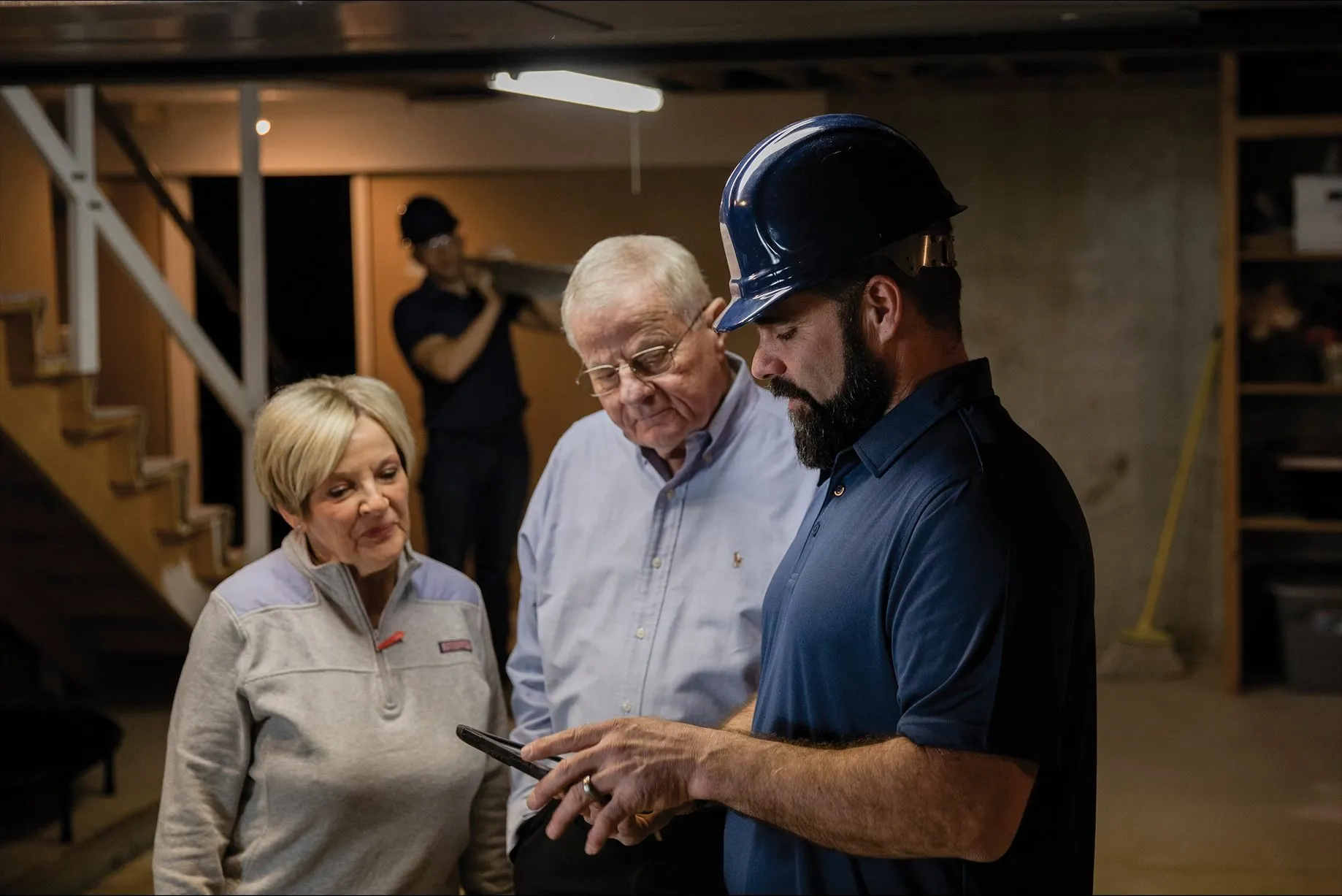
FAQs
You’ve seen some typical foundation problem warning signs and learned about how they happen. But you still might be wondering what’s in it for you with undertaking repair projects. The answer is a lot! There are so many ways you can benefit from fixing your foundation issues. Here are just a couple of advantages:
- Enhanced Structural Integrity and Safety — First and foremost, the safety of your house and everyone living in it should be a top priority. Don’t you want a safe and stable place to live and for your family to grow and create memories? If you have a feeling something could be wrong, don’t put off fixing your foundation issues. The longer you wait to repair them, the more costly and extensive they could become. Plus, you’d be putting your family’s wellbeing at risk. But if you catch the warning signs early enough and fix them with the right solutions, you may not need to have to take on as much of a project as you thought. Even if you’ve got other projects and upgrades you’d like to tackle, remember the sayings about having a strong foundation. Start from the ground up to ensure your home will stay standing for a long time.
- Improved Real Estate Value — Your house is going to be on the real estate market at some point – whether you intend to live in your house for several years or you plan to sell it soon. In any case, you need to make sure it’s ready and that its market value is intact. The best way to do that is to fix any newly noticed or lingering foundation problems before selling. You could sell as-is, but you’ll still have to fill out the Seller’s Property Disclosure form. With this form, you’ll have to disclose any known past or current problems like cracks, heaving, settling, and exterior issues. Plus, foundation issues can reduce your home’s resale value by 10 to 30 percent, and homebuyers could have problems getting a mortgage. Most homebuyers expect a home to be free of problems, and a safe and stable house is much more attractive to potential owners as opposed to one with cracks and uneven floors.
Now that you’ve learned more about foundation problems and why they need to be fixed, don’t you feel motivated to tackle these issues head-on? Wouldn’t it feel great to finally fix your foundation for good?
A lot of people consider whether they should repair the problems at hand or go all in and replace the whole foundation. In this faceoff of foundation repair vs. foundation replacement, repairing is the clear winner. Foundation replacement is quite invasive and time-consuming, and it won’t truly get to the root of the problems. But various repair methods will permanently solve the issues, so you won’t have to worry about them again.
Before you start planning, first think about who is going to be doing these repairs. True, fixing your foundation can get expensive and you’re probably thinking you could save a few dollars here and there by doing it yourself. However, as handy as you may be, foundation repair is a serious undertaking that is best suited for experienced repair professionals.
No doubt you’ve heard about people who had less than stellar experiences with contractors who didn’t fix the problems, made the issues worse, or failed to complete the job at all. But don’t let these tales completely influence your decision to hire a contractor.
We know it can feel intimidating trying to find the right contractor and trust them with your home. But the best thing you can do is be prepared and arm yourself with knowledge and research. Take the time to thoroughly do your homework and inquire about foundation repair companies. Learn as much as you can about a company and make sure your contractor of choice has the experience you need to get the job done. Ask for reviews and references and check third-party resources like the Better Business Bureau. Request contractor must-haves like licenses, certificates, insurance, warranties, and other pertinent documentation.
Undoubtedly, the cost of repair is one of, if not the, biggest concerns we hear from homeowners. And that’s natural. Money matters, and so does your home. You want to make sure it is being protected by the best, cost-effective solutions.
There is a lot to consider with these types of repairs including what kind of repair is needed, the area needing to be repaired, the extent of damage, labor, materials, etc. All these things differ from company to company, so be sure to have a thorough discussion with your contractor about pricing and payment.
Also, no two foundation problems are alike. Every house has its own unique problems and requires its own special solutions to fix them. So, what worked for friends and neighbors to fix their homes may not necessarily be what your house needs.
To give you an idea, average home improvement spending is around $7,500, and many homeowners pay between $4,000 and $10,000 for foundation repairs. Some average foundation repair product prices are $1,000-$3,000+ per foundation pier, $500-$1,300+ for leveling/slab jacking, and $2,000-$6,000 for sealing/subfloor drainage.
Check with your insurance carrier regarding concerns with repair needs and insurance coverage, as all policies are different. Some policies may cover losses from fires, but many exclude coverage for issues such as foundation cracks or settling. But coverage may kick in if the foundation has been damaged from other problems like broken plumbing, for example. (Source: SF Gate)
If you are concerned with working with a contractor, rest assured you will be in good hands with Foundation Repair of Western Colorado. When you choose to work with us, you are our No. 1 priority, and you become part of our family.
The first thing we’ll do is work with you to schedule a time for one of our certified field inspectors to visit your home for a free inspection and estimate. It’s important for the inspector to physically be in your home to look at exactly what is going on. He will complete a thorough assessment of your home and its foundation, including looking for signs of cracks and other symptoms and measuring for movement and settlement. That way, he can recommend customized solutions that will specifically address your home’s repair needs.
As the inspector lets you know exactly what steps need to be taken to permanently stabilize your foundation, he will prepare a written estimate detailing the work, products needed, and costs. He will take your budget into consideration as well as discuss financing options with you. Take your time to sit with this estimate and think it over, and don’t be afraid to reach back out to your inspector with any follow-up questions and concerns.
Once you decide to go ahead with the work and have signed a contract with your inspector, we’ll then schedule this work with one of our highly trained crews. The crew will take great care in installing proven solutions to restore value to your greatest investment. The job is not complete until you are completely satisfied with the work. So, if something comes up during the process or if the work isn’t living up to expectations, don’t be afraid to speak up. We also offer service and maintenance opportunities to ensure the systems we installed continue to operate at a high level to protect your home.
We use only warrantied foundation repair products that have proven to be effective for repairing issues like cracks, sinking, bowing walls, and more. We ensure the best solution for your home’s specific needs.
Manufactured right here in the United States, each foundation product is carefully designed and tested by a team of structural and geotechnical engineers. All our systems also come with a written warranty so that you know your problem was fixed right.
Our strong wall reinforcement and piering solutions are made with galvanized steel to prevent rust, corrosion, and damage, and stand up to the toughest forces to give you peace of mind.
Here is what we’ll use to protect your home and help restore its safety and value:
- Wall Repair and Reinforcing Systems – The severity of wall damage can vary, so we offer a few different options for wall repair and reinforcement.
- Wall Anchors – Durable earth anchors are securely embedded in stable soil away from the foundation wall, and they are connected to sturdy steel interior wall anchor plates with long galvanized steel rods. This system will permanently stabilize the wall and offer the best opportunity to straighten it over time. This unique system also offers the ability to tighten the anchors when exterior soil shrinks during dry periods.
- IntelliBrace™ Beams – Similar to Wall Anchors, IntelliBrace™ beams permanently stabilize foundation walls and can help straighten them over time. This system is ideal to use when there is little or no access available outside of the home for exterior wall repair.
- Carbon Fiber Supports – Strong Carbon Fiber supports firmly adhere to the walls to stabilize them and hold them in their current positions, preventing any further cracks or inward movement. They have a low profile and a smooth finish, allowing them to easily be painted or concealed by basement finishing materials.
- Foundation Pier Systems – Heavy-duty piering systems are needed to properly address foundation settlement. These piers are installed deep into the ground and down to more stable soil to permanently stabilize the home and help lift it back to its original position.
- Push Piers – Push Piers are hydraulically driven through a bracket attached to the foundation footing and down to bedrock or a stable soil layer. This is the most used type of pier for most foundation settlement applications.
- Helical Piers – Helical Piers function like Push Piers and are installed almost the same way. But Helical Piers are manually advanced or screwed into the ground. These piers typically are used in specialty foundation settlement applications and for very light structures like porches.
- Slab Piers – Slab Piers are installed like Push Piers and Helical Piers, but these piers and are used to stabilize your concrete slab foundation.
- Crawl Space Supports – We use IntelliJacks™ to stabilize and help lift sagging crawl space or basement floors and floor joists back to level. Our crawl space support system has an allowable load capacity of more than 24,000 pounds per support jack, and is tested and certified to the highest industry standards.
Additionally, we can use the PolyRenewal™ system to lift and level cracking, settling concrete slab floors in your home and garage.
You don’t have to live with stressful foundation problems. Take back your home and enhance its safety for the happiness and wellbeing of your family. If you have any questions along the way, don’t hesitate to contact us for assistance! We are eager to help you repair and protect your home by creating a safer and healthier living environment!

